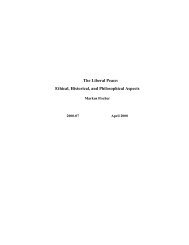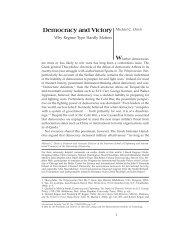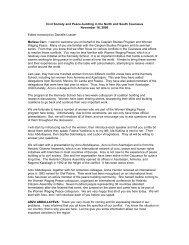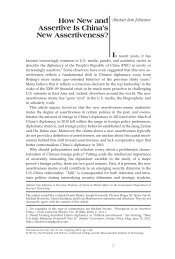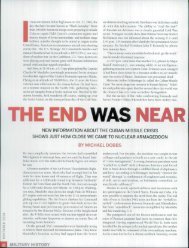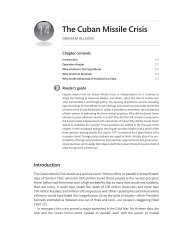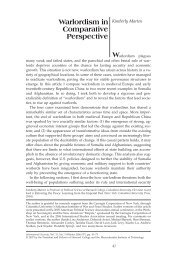The Cuban missile crisis and intelligence performance
The Cuban missile crisis and intelligence performance
The Cuban missile crisis and intelligence performance
You also want an ePaper? Increase the reach of your titles
YUMPU automatically turns print PDFs into web optimized ePapers that Google loves.
Downloaded by [Harvard College] at 08:23 18 September 2012<br />
190 INTELLIGENCE AND THE CUBAN MISSILE CRISIS<br />
however, that unrealistic expectations about <strong>intelligence</strong> <strong>performance</strong>,<br />
coupled with underst<strong>and</strong>able but misguided views about what retrospective<br />
evaluation is for, typically frustrate the enterprise.<br />
Three common temptations represent obstacles to fruitful retrospective<br />
evaluation: the temptation to focus on the specific <strong>and</strong> the spectacular (a<br />
form of selection bias); the temptation to privilege hindsight; <strong>and</strong> the<br />
temptation to try to evaluate <strong>performance</strong> in terms of a 'rate of success.'<br />
1. Selection bias. It is almost irresistible to focus on particular dramatic<br />
failures when assessing <strong>intelligence</strong> <strong>performance</strong> retrospectively. <strong>The</strong><br />
enormous literature on surprise attacks provides a useful example.<br />
Admittedly, these are engrossing events. It may be doubted whether studies<br />
of <strong>intelligence</strong> successes could compete for our attention, because one of the<br />
chief things that makes a failure spectacular is that it has a dramatic<br />
consequence. A properly-exploited <strong>intelligence</strong> success may lead to the<br />
prevention of something spectacular. Moreover, a success does not provide<br />
the occasion for public angst about <strong>intelligence</strong> capabilities, <strong>and</strong> would not<br />
normally spawn public review or discussion. Our fascination with failures<br />
is entirely underst<strong>and</strong>able. However, it is clear that by focusing our attention<br />
on failures, we may overestimate the weaknesses of an <strong>intelligence</strong><br />
community - much as aviation disasters incline people to exaggerate the<br />
dangers of flying (uneventful flights do not make headlines).<br />
In principle, we could avoid this temptation by making an effort to study<br />
a representative sample of <strong>intelligence</strong> episodes - selecting not on the<br />
outcome, but r<strong>and</strong>omly, or by period of time. But this is easier said than<br />
done. Successes leave less of a documentary trail than failures, <strong>and</strong><br />
mundane episodes attract less attention than dramatic ones. <strong>The</strong>re may<br />
simply not be enough information available to conduct a truly balanced<br />
study. <strong>The</strong> combination of inherent allure <strong>and</strong> available information means<br />
that spectacular <strong>intelligence</strong> failures have an almost irresistible gravitational<br />
pull.<br />
2. Privileging hindsight. Hindsight tends to color our judgments of how<br />
<strong>intelligence</strong> analysts should have interpreted information. This leads to<br />
unrealistic expectations about <strong>performance</strong>.<br />
Once we know what has happened, we can easily distinguish between<br />
meaningful <strong>and</strong> meaningless indicators: the signals st<strong>and</strong> out starkly from<br />
the noise. But to <strong>intelligence</strong> analysts attempting to anticipate events, those<br />
same signals may be barely perceptible, <strong>and</strong> quite underst<strong>and</strong>ably so. 56 After<br />
the Japanese attacked Pearl Harbor, it was easy to see that there was plenty<br />
of information available on the basis of which US <strong>intelligence</strong> might have<br />
anticipated the attack. It is tempting to take the further step <strong>and</strong> fault US




